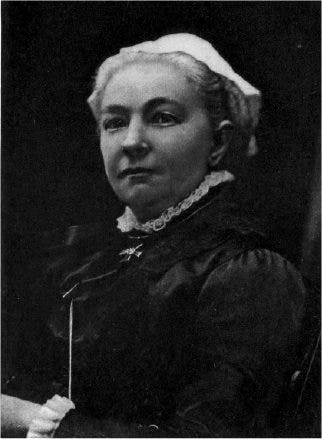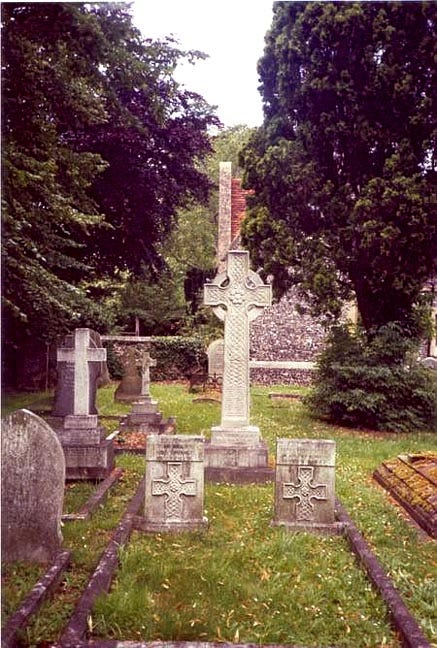Mrs Oliphant: The Patron Saint of the overworked single parent
Or how 'having it all' has never been easy!
There is so much to love about Mrs Oliphant, and not just her name which makes her sound like a friend of Winnie-the-Pooh, or her ‘sympathetic granny’ expression. She should be the patron saint of all exhausted single mothers, of every working parent who feels that they are failing at both the job and the parenting. Of everyone who has faced so much hard reality that romance has lost its glow, but can still feel happiness in the moment. This is the woman who at the age of 31 found herself pregnant and widowed with two small children, in a country where she knew no-one and did not know the language, who buried her husband and came home to face significant debt but never lost courage. And never failed to provide for an ever-increasing circle of dependents who gave her nothing in return.
Her literary output was truly prodigious: the full count of works may never be known, but we are certain that in less than fifty frenetic years she published nearly 100 novels, 25 works of non-fiction including biography, literary history and travel, 50 short stories and 300 articles and essays for periodicals. Not surprisingly, the quality was patchy, often humdrum, but always professionally delivered and occasionally brilliant. Hester, one of her later and best novels, was published by Macmillan in 1882, and the real heroine of the book is not the title character, a pretty young heartbreaker, but Catherine Vernon, a women in her sixties, who once saved the family bank from ruin, and is now holding her own in a man’s world as the head of a flourishing business. Jilted in her youth, she holds the reins of power over her extended and ungrateful family, only too aware that she has never managed to win their love or even their gratitude. Mrs Oliphant was writing from the heart.
Oliphant was born Margaret Wilson in Scotland in 1828, and although she lived most of her life in London and the Home Counties, she never lost her Scottish accent. Her father was a not particularly successful Customs Official and made little impact on his daughter’s life: it was the two older brothers Willie and Frank that she doted on, and her forceful mother who educated her and encouraged her to write. Her first novel, Mrs Margaret Maitland, was published when she was just 21; shortly afterwards she moved to London and married her cousin Francis Oliphant, a man trying to make a name for himself as a designer of stained glass. In the seven years that they were married Margaret produced two living children, Maggie and Cyril, and buried three more, including a little girl Marjorie who died before she was one. Her own mother died within a few months of this. In 1859 Francis was told that he was dying of tuberculosis: he chose not to tell his wife, but instead dragged her and the two surviving children on a frantic journey across Europe to Rome, where he died.
Margaret had been funding their journey on advances from her publisher, Blackwood. She waited for the birth of her last child, Cecco, and then set off back across Europe with the three tiny children and a maid, conscious that her debts were in the region of £1,000 and she would have to pick up her pen and start writing if they were to survive.
I am not proposing to write a literary biography here, the best guide I have found to her output is The Equivocal Virtue by Vineta and Robert A Colby, (1966). What fascinates me is Oliphant’s self-awareness: she knew that the pressure on her to write was holding her back from improving her work, she knew that she was struggling to achieve the financial recognition she envied in contemporary novelists (she was extraordinarily, even bitchily envious, of the success of Eliot, Trollope, and of Miss Mulock, her ‘friend’). She knew that she was sacrificing her talent, if indeed she had it in her to write a masterpiece, on the altar of her family. Tragically, this blew up in her face: she outlived all her children, and as she had foreshadowed in her writing of Catherine Vernon, her family would take her for granted and ultimately disappoint her.
The one major success in her lifetime was her series of novels set in an imaginery town, Carlingford: a conscious imitation of the Barchester Chronicles, although not as enduring. These sold well, and for the third in the series, Blackwood gave her an advance of £1,500, the most she ever received. The series included Miss Marjoribanks, an amusing social comedy that still reads well today. All the time the pressure on her was increasing. In 1864, on the back of this success, she proposed a trip with children and friends back to Rome, where she had a happy time until her little daughter Maggie contracted gastric fever and died. It broke Margaret’s heart: she buried the little girl alongside her father and vowed never to set foot in the accursed city of Rome again. Her brother Willie lived in Italy, but he was of no use, he was an alcoholic and already on the long list of people Oliphant was supporting with her writing. In 1868 her other brother Frank was made bankrupt, and after the sudden death of his wife, his four children joined the Oliphant extended family.
Margaret took a house in Windsor so that she could send her two sons Cyril and Cecco, and her nephew Frank, as day boys to Eton. Here is a photo of the boys standing on the steps of this house with her:
This photo seems to me to say it all - the boys have all turned their back on her, and she appears to be fingering a watch that’s telling her to get back to her desk. She is only 46 in this photo, after all, and yet looks like an old lady: her whole life has been spent feeding, clothing and educating these boys, who will ultimately let her down. Twenty years later all three would be dead, and Oliphant would be left alone wondering how all her plans and dreams had come to nothing. It took time and money to train her nephew Frank as an engineer, whereupon he went to India and died of typhus. Not his fault, but very sad. Cyril failed to get the scholarship to Balliol she had hoped for, and then failed to make a success at the Bar and wasted his remaining years in failing to get one job after another that his mother proposed him for. Cecco followed a similar path, but was dogged by consumption. ‘My dearest, bright, delightful boy missed somehow his footing. How can I tell how?’ Neither man had managed to earn a living by the time they went to their early graves. The heartrending last line of her Autobiography: ‘And now here I am, all alone. I cannot write any more.’
’
Like so many working mothers, Oliphant blamed herself: she wrote that because she had hidden the struggles from the boys, and tried to make everything look easy, she had failed to instil in them the need for energy and effort. And she had affected to despise intellectuals. She wrote about her oldest boy, Cyril:
It was one of my foolish ways to take my own work very lightly, and not to let him know how hard pressed I was sometimes, so that he never, I am sure, was convinced how serious it was in that way, and certainly never was convinced that he could not, when the moment came, right himself and recover lost way… Another theory I have thought of with many tears lately. I had another foolish way of laughing at the superior people - the boys of pretension and all the strong intellectualisms. This gave him, perhaps, or helped to form, a prejudice against the good and reading men.
It is possible that Cyril drank, as his uncle had. Margaret in her Autobiography, talked of ‘inherited tendencies.’ In 1884 Macmillan published The Wizard’s Son, which contains a searing portrait of a boy like Cyril:
The fact remained that at twenty-four, Walter, evidently a clever fellow, with a great many endowments, had got nothing to do: and what was worse - a thing which his mother, indeed, pretended to be unconscious of, but which everybody else in town remarked upon - he was not in the least concerned about the fact.
This description may well have rung bells with Alexander Macmillan, who would have recognised a pattern of behaviour shared by his own eldest boy, Malcolm. To a parent who has struggled and fought to achieve so much, it would be heart-breaking to see it all taken for granted in this way.
It is Margaret Oliphant’s Autobiography (last published by Oxford University Press in 1990? ) that allows us to see inside her mind, to see her doubts about her own abilities, her despair at the loss of her beloved children, and her fears that it has all been for nothing.
…rather a failure all round, never securing any strong affection, and throughout my life, though I have had all the usual experiences of women, never impressing anybody. What a droll little complaint! Why should I? I acknowledge frankly that there is nothing much in me - a fat, little, commonplace woman, rather tongue-tied - to impress anyone: and yet there is a sort of whimsical injury in it which makes me sorry for myself.
Nevertheless, she took pride in her survival, she adored her children when they were little, and she made friends and tried to enjoy the literary life in London.
I have lived a laborious life, incessant work, incessant anxiety - and yet so strange, so capricious is this human being, that I would not say I have had an unhappy life… I have written because it gave me pleasure, because it came natural to me, because it was like talking or breathing, beside the big fact that it was necessary for me to work for my children.
She said frequently that she knew her work was never as good as she had hoped it to be: others saw the potential in her. In May 1865 as Son of the Soil was going to press, her publisher Alexander Macmillan wrote full of changes he would have made, but concluding ‘With all its faults it is a very excellent story and has very high qualities. I am always hoping some day however that you will do a thorough work of art. Painfully and carefully worked out. Forgive my preaching. I was a schoolmaster many years.’
She wondered if, without her children and her responsibilities, she could actually have been a George Eliot ‘Should I have done better if I had been kept, like her, in a mental greenhouse?’ Like every single parent she felt frustrated by the need for compromise, but she taught herself to think that bringing up three fine young men was as valuable as any brilliant novel. Nevertheless her disappointments leaked into her fiction: her novels and stories are peopled with disappointing men: alcoholics, like her brother, bankrupts, like her other brother, men who just cannot face reality or knuckle down to hard work, perhaps like her father and her husband. She also understood that women could still love these men. Her novel Agnes, written in the aftermath of the terrible return from Rome, contains just such a passage:
She was no longer able to admire Roger, however much she tried, nor look up to him, nor even to trust him much. She was aware that his ideas of right and wrong were confused, and his impulses very often anything but just ones: and when any emergency occurred, Agnes was very far from being confident that her husband would not utterly break down in it; and yet, withal, she had not ceased to love him, and stand by him with all her might, which wonderful problem of humanity is one very little discussed in works of imagination.
Very little discussed, except in the works of Mrs Oliphant. Her work teems with the themes of motherhood, widowhood, and financial responsibilities, areas where she had more insight and experience than many of her contemporaries. She was less interested in the Marriage Plot: it occupied so small a part of people’s actual existence. Some of her more successful later fiction concerned the supernatural, particularly A Beleaguered City, seen by the Colbys as ‘something unique in her writing…a labour of love.’ There had been so much death in her life, and the shaking of the Victorian confidence in the Christian afterlife made ghost stories, where lost ones could reappear on Earth, appealing to a wide audience.
Mrs Oliphant died in 1897, aged only 69, convinced that nothing she had achieved would outlive her. She would be gratified to know that some of her better novels still appear in print from time to time, that her work is studied by academics, that there is a blue plaque on the house in Windsor, that the Eton graves are well-tended. She would be very annoyed that the date on the plaque is wrong, but would probably think it was typical of her failures in life.
I will give her the last word, which will ring true with everyone who finds it hard to balance competing responsibilities, pleasures and talents, with everyone who thinks they might have a masterpiece in them if only they could find the time:
I never did nor could, of course, hesitate for a moment as to what had to be done. It had to be done, and that was enough, and there is no doubt that it was much more congenial to me to drive on and keep everything going, with a certain scorn of the increased work, and metaphorical toss of the head, as if it mattered! than it ever would have been to labour with an artist’s fervour and concentration to produce a masterpiece. One can’t be two things or serve two masters.








Loved this, Sarah. I have come across Oliphant in my literary studies, but I didn't know all this about her. Her output is remarkable, especially given her single-mother status, and her need to look after the whole family. I think it's so sad that she never really thought she had achieved her full potential with her writing, despite her considerable achievements, but I find it even sadder that she ultimately blamed herself for not being a good enough parent. Her ideas around playing down her own work really rang true to me as a parent, and as a woman writer, I think. I have often found myself doing this and it is a timely reminder that if we don't take our work seriously, then others may not respect the time we spend on it. Thank you! : )
Thanks for sharing this and connecting today! Really enjoyed this post and looking forward to more. :)